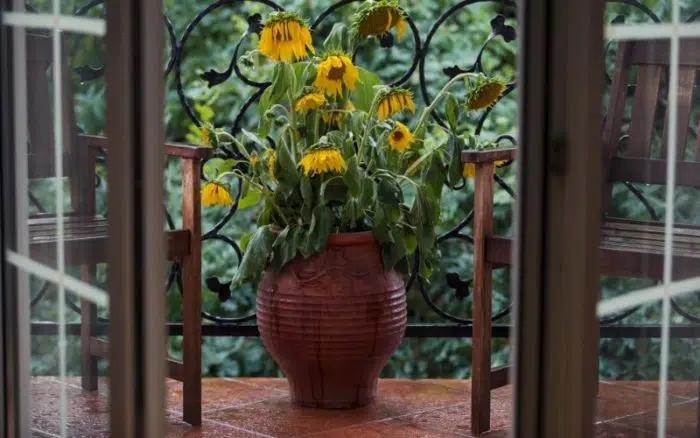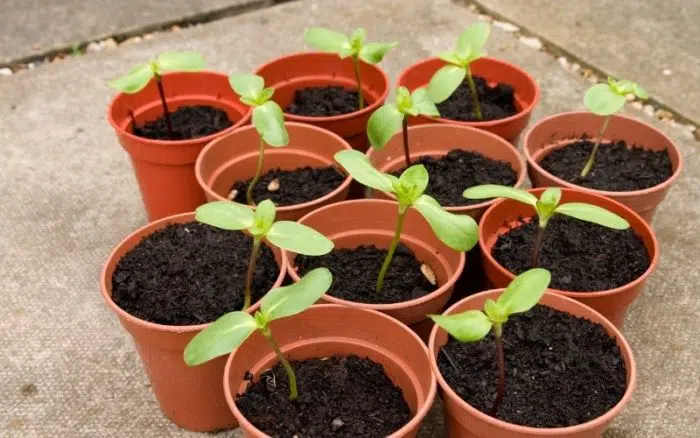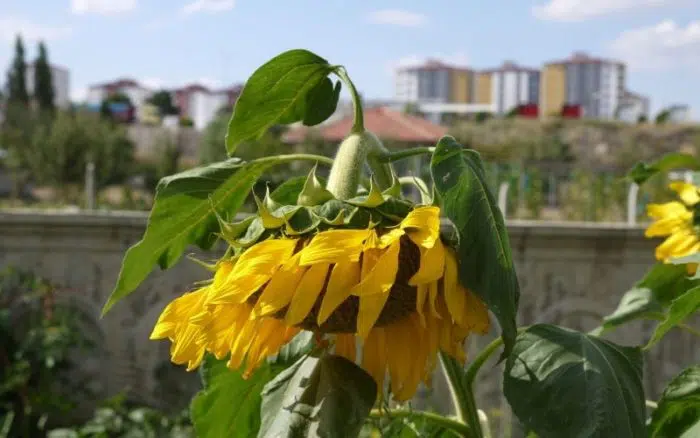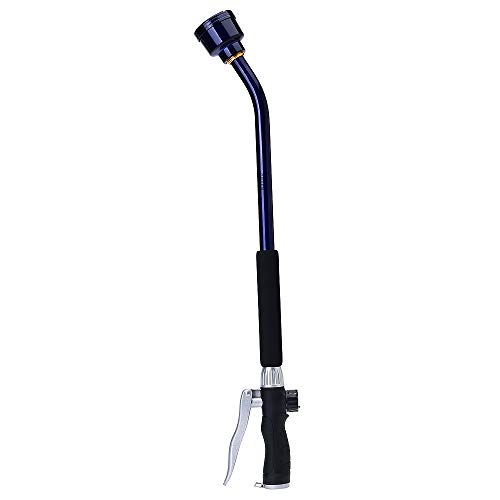Sunflowers are great at attracting bees and other pollinators, which can help your other plants thrive. But they also are just beautiful to look at and add a pop of color to your garden.
If you’re lucky enough to have sunflowers in your garden, you’ll want to know how often to water them. The answer, of course, depends on a number of factors, including the type of sunflowers you have, the weather, and the soil.
How Much Water Do Sunflowers Need?

For optimal growth, sunflowers need 1-2 inches (2-4 cm) of water each week. This amount can be adjusted based on the type of soil in your garden, the weather, and whether you’re growing a giant sunflower or dwarf variety.
When you are watering sunflowers, water the soil thoroughly (deep watering) so it sinks down around 6 inches below the surface.
How Often to Water Sunflowers
So we know that sunflowers need quite a bit of water and they should be watered deeply. But should you do this all at once, or water them a little bit each day?
As a general rule of thumb, you should water sunflowers about once every few days. If the weather is particularly hot or dry, you may need to water more frequently. On the other hand, if it’s been raining quite a bit, you will be able to get away with watering less often.
Ultimately, the best way to determine how often to water your sunflowers is to check the soil regularly. If it feels dry about an inch below the surface, it’s time to give your plants a drink of water.
Whether you’re growing in-ground plants, or in a pot, or are a daredevil and transplanting sunflower seedlings outside, they are going to have different needs. Let’s take a look at each scenario for growing sunflowers.

Watering Sunflowers in Pots
If you planted sunflowers in a pot outside (even if it’s sitting by the door or on the patio), it will require more attention because of its climate. The sun’s rays are much stronger than the light it will get indoors, and that could cause the soil to dry out faster.
I like to use a method called deep watering, where you water plants fully and make sure the entire pot is wet. Usually, after a good watering, you can skip the following day (unless it’s going to be very hot).
If the weather is calling for a lot of rain, hold off on watering the plant so it doesn’t get too much water.
Keep the soil moist and warm, water as often as every three days. But also make sure the plant does not sit permanently in wet soil or this can cause overwatering issues (see below).
If the weather forecast is super dry and hot, make sure to check the plant daily (sometimes more than once per day) to see if it needs a drink of water.
With container-grown sunflower plants, you want to water often so the soil does not dry out completely, but be aware that overwatering can also damage the plant. Avoid watering after dark, as this could cause mildew to grow.
Watering Sunflowers in Raised Beds & in the Ground
If you have sunflower plants in raised beds or in the ground, you usually only need to water them every few days unless it’s quite hot outside. Depending on which zone you live in, your sunflowers can often see quite a bit of rain during parts of the season.
If you live in a more dry area or are experiencing weeks where there is no rain in sight, you’ll want to check your sunflowers daily to make sure they don’t need water.
When planting sunflowers, I like to plant multiple seeds to ensure the best germination rates and that I come out of the process with enough sunflower seedlings.
Depending on what stage you are at, they have different water requirements.
- With tender plants that are younger, they often do best getting watered more regularly. Check on them daily to make sure they are doing alright.
- With a more mature, full-grown sunflower, they are hardier and can usually go a few days without being watered. However, if the weather is very warm and dry, check on them daily.
When overhead watering, be sure to use your hose nozzle on the lowest setting or invest in an inexpensive watering wand that helps with accuracy. You want to water the ground around the sunflowers, as wetting the leaves and sunflower head won’t help it retain any moisture.
- Made with aluminum making it lightweight, yet durable
- Rubber foam along the wand for additional protection at the natural wearing point.
Add Mulch to Your Garden
When growing sunflowers in the ground, you can save yourself a lot of hassle by adding mulch around the plants.
This helps reduce water evaporation and keeps the soil surrounding the plant from getting too hot, causing your plants to dry out too quickly. At the same time, mulch will help the ground temperatures to stay consistent if temperatures fall overnight suddenly.
Another added benefit of organic mulch is that it reduces the splash-back effect and helps prevent dirt and possible disease from splashing up onto the leaves when it gets watered or it rains.
Add 1-2 inches of cedar mulch (my favorite), leaf mulch, straw/hay, or other kinds of mulch.
Drip Irrigation System
You can also cheat the system and use a drip irrigation system, which essentially can take most of the guesswork out of when to water sunflowers.
You essentially hook the system up to your hose and it automatically drips out the water regularly throughout the day. You can really get crazy and get an automated one that will stop watering when it rains.
How to Tell if Sunflower Needs Water
Sunflowers grow best when they are properly watered. But how do you know if they are okay or if they need some water?
There are a few ways to check if your sunflower plants need to be watered.

Germination Stage
Sunflowers thrive with a lot of water during their germination. Seeds germinate much faster when they are given adequate lighting and water. If you are getting started with plant sunflower seeds or are tending to younger plants, water them daily unless it rains.
During germination, the soil around the sunflower plant should be consistently moist, without being in standing water for best results.
Look for Wilting
Oftentimes, when sunflowers needs water they will tell you. No, it won’t say anything out loud, but actions speak louder than words anyway right? 😉
Sunflowers are one of the first things to show signs of drying out. So its leaves will often look like this and that’s a sign to you that you need to give that bad boy a drink.
Test the Soil with Your Finger
You can also check the top inch or so of the soil surface. If it’s dry and you don’t feel water an inch down, go ahead and water it.
If you can feel any kind of soil moisture, it’s probably best to wait a day so you don’t overwater your sunflower.

Can you Water Sunflowers Too Much?
Yes, there is a way you might be watering sunflowers too much. Overwatering your plants consistently can even lead to root rot, which is not good for flower production.
Signs you are watering your sunflowers too much:
- Drooping flowers and flower petals
- Leaf discoloration
- Mushiness around the base of the plant stem
How Many Times a Week Should You Water Sunflowers?
You want to be maintaining consistent soil moisture, but not letting your plants be constantly wet. A little moisture is nice to keep around your plants. Around an inch per week is sufficient, which means usually around every 1-2 days you’ll be giving them a proper watering.
How Often to Fertilize Sunflowers?
Sunflowers grow pretty fast, which can lead to them using up nutrients too quickly. A nitrogen based fertilizer can be added every 1-2 weeks during the growing season, and once about 2 weeks before the heads are blooming.
Don’t go overboard here as too much nitrogen can cause your plant to have lots of leaves and no flowers.

Harvest Sunflower Seeds
When the petals of sun flower head begin to dry out and fall away, it’s time to start harvesting sunflower seeds!
These edible seeds are coveted by other animals, so make sure you don’t hold off on the harvesting process for too long. Deer, birds, and squirrels are some of the animals that love sunflower seeds.
You can eat these delicious seeds or save them for next year so you don’t have to buy more sunflower seeds for growing.
Properly Watering Your Sunflowers
Whether you’re growing dwarf sunflowers or mammoth and giant varieties, when you grow sunflowers you are adding beauty to the garden. But making sure you are on the proper watering schedule right is vital. Overwatering can lead to root rot, but underwatering can lead to stunted growth.
When you plant sunflowers, you’re adding a beautiful pop of color to your garden that attracts beneficial insects and pollinators.
Sunflowers are annual plants, which means they only live for one growing season. However, they are relatively easy to care for. They prefer full sun and well-drained soil, and they don’t need much fertilizer.
Once they’re established, sunflowers are fairly drought-tolerant. And, unlike many other flowers, they don’t require deadheading (removing spent blooms). Just plant them in early spring, water them regularly, and enjoy the show!



